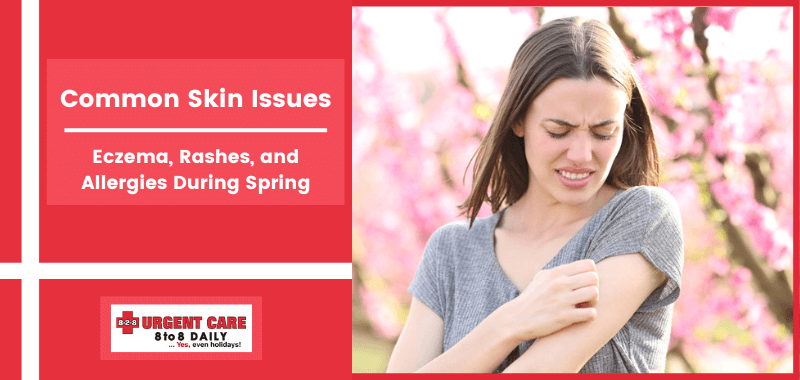


Spring is a season of rebirth and renewal, but for some, it brings with it the onset of frustrating skin issues. Eczema, rashes, and allergies are among the most common conditions experienced during this time of year. These skin problems can cause discomfort and embarrassment, affecting one's quality of life. In the United States, about 31.6 million people have symptoms of eczema. According to AAFA research, skin allergies are also a common complaint, affecting 50 million Americans annually.
Understanding the triggers and effective treatment options can help individuals manage these conditions and enjoy the season to the fullest. This blog will explore these skin conditions, their causes, symptoms, and available treatment options to help you better understand and manage these troublesome skin issues.
Skin issues are any problem or condition that affects the skin's appearance or function. Some common skin issues affecting your body during spring include eczema, allergies, and skin rashes. Eczema is a chronic inflammatory skin condition causing red, itchy patches. Allergies can cause various skin symptoms, including rashes, hives, and swelling. Skin rashes can be caused by various factors, such as allergies, infections, and autoimmune disorders. These conditions can affect the body by causing discomfort, itching, and pain, and in some cases, can lead to more serious complications.
There are several signs and symptoms that can occur in allergies and skin rashes in the spring season. Some of the common ones include:
Skin issues such as eczema, allergies, and skin rashes can have several common causes, including:
Here are some remedies that may help reduce skin rashes, eczema, and different types of allergies during the spring season:
Identify and avoid triggers that may be causing your skin rash, eczema, or allergies. Common triggers may include allergens such as pollen, dust mites, pet dander, certain foods, harsh chemicals, and soaps. Try to minimize your exposure to these triggers to help reduce symptoms.
Keeping your skin well-moisturized can help reduce dryness, itching, and inflammation associated with skin rashes and eczema. Use a gentle, hypoallergenic moisturizer regularly, especially after bathing or washing your hands.
Avoid harsh soaps, detergents, and skin care products containing fragrances or other irritating ingredients. Opt for mild, fragrance-free products specifically formulated for sensitive skin.
Regularly clean your living spaces, including bedding, carpets, and upholstery, to minimize exposure to allergens like dust mites and pet dander.
Scratching can worsen skin rashes and eczema, leading to further irritation and inflammation. Avoid scratching or rubbing the affected areas, and use cool compresses or anti-itch creams to relieve itching.
The experienced providers at 8-2-8 Urgent Care have vast experience treating different allergies and rashes with the utmost care and precision. At 8-2-8 Urgent Care, you receive a timely diagnosis and effective allergy treatment for such issues. We provide urgent care to soothe the condition and manage any symptoms, including extreme ones. You can also contact 8-2-8 Urgent Care, and our staff will walk you through our online check-in from the convenience of your home! Call (760) 216-6253.